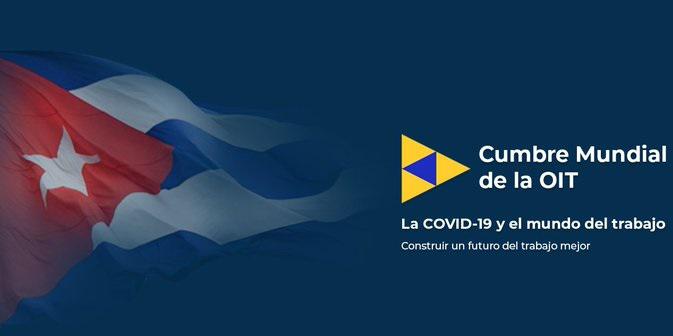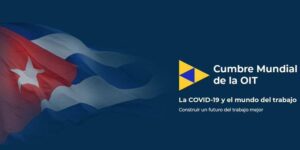
One year after the centenary of the ILO was celebrated, Cuba as a founding country, presented its experiences in labor protection during this stage of confronting the new coronavirus pandemic.
Labor measures adopted in Cuba before COVID-19
In Cuba, various measures were adopted to prevent and confront COVID-19, from the Health protection policy for all the people, fiscal policies, job maintenance, social protection for all, among others.
36 measures were applied in the labor, salary and social security order, remote work and teleworking were promoted, workers were relocated to other positions and the wage guarantees of workers who are in their homes to care for minor children were extended , older adults and people in conditions of fragile health or that could not be relocated.
More than 240,000 non-state sector workers were exempted from taxes, pensions were maintained, and social workers pay special attention to families who require it.
The protection measures were broader than those previously established by law, for workers in the state sector, as well as non-state. Those who fell ill were paid subsidies and those who were ordered preventive isolation due to the disease also receive protection. In all cases, the workers maintained their working relationship with the entity.
All the protection measures approved are broader than those previously established by law. No one was and will not be abandoned.
Data:
- Total state sector workers- 2 million 855 thousand 754
- Relocated workers- 48 thousand 343.
- Interrupted workers- 146 thousand 507, protected with wage guarantee- 77 thousand 180.
- Mothers with children in primary education- 78 thousand 301
- Mothers with children in children’s circles- 10 thousand 955
- Workers in isolation dictated by the health authority- 8,776.
- Older adults (over 60 years and under that age but with fragility of health) – 71 thousand 409.
- Self-employed workers- Total- 613 thousand 921, benefited with the temporary suspension- 243 thousand 308. This implies certain benefits such as exemption from paying taxes, deferral of the contribution to social security, among others.

Cuba, the ILO and workers’ rights
Cuba feels legitimate pride and satisfaction in being a founding country of this International Labor Organization.
The country’s commitment to the ILO and workers’ rights has remained unchanged. As proof of this, our country is a State party to the 8 Fundamental Conventions of the Organization.
The objective of building an increasingly sovereign, independent, socialist, democratic, prosperous and sustainable nation, on the basis of which we have continued to perfect the Cuban model of economic and social development, includes strengthening the promotion and protection of the rights of workers and union freedoms.
The new Magna Carta of the Republic, among other advances in the economic and social sphere, further strengthened the recognition and legal protection of the rights of all workers, including those of the non-state sector of the economy.
It recognizes the right to work and to obtain a decent job; consecrates that all people, without any discrimination, receive equal pay for equal work; and prohibits the work of girls, boys and adolescents.
Likewise, it recognizes and protects the right of workers to rest, the 8-hour workday, weekly rest and annual paid vacations; as well as social security when the person is prevented from working due to age, maternity, paternity, disability or illness.
At the same time, it enshrines the responsibility of the State to guarantee the right to health and safety at work; and to organize institutions and services that support working families.
In turn, the Labor Code, adopted in 2013, ratified the protection of trade union freedoms, including the freedom to associate voluntarily and form trade union organizations.
In Cuba, union work is essential for the realization of workers’ rights, and for the achievement of the economic and social objectives that we have set for ourselves as a nation.
The union organizations brought together by the Cuban Workers Central are autonomous. Its members approve their own statutes and regulations, democratically discuss and make agreements, and elect or revoke their directors.
They carry out their tasks without interference from the authorities and their leaders have the necessary guarantees for the exercise of their management. More than 90% of Cuban workers are unionized. They are beneficiaries of social, participatory and democratic dialogue. Collective bargaining is a reality in Cuba.
In our country, policies have been implemented that favor full employment, stimulate the incorporation of young people into work, protect women and the working family, and strengthen social security and assistance.
We have continued promoting the access without exclusion or discrimination of people with disabilities to work, attending to their choice, their level of training and the demands of the economy.
We show relevant results in terms of women’s access to employment. Women, who make up the majority of the workforce in various sectors, enjoy the same rights as men, including in the workplace. They receive equal wages for work of equal value; and the maternity of working women is protected, with specific norms and policies.
We have continued to make progress in the matter of the right to equality, which in the workplace has been expressed in greater guarantees for non-discrimination for reasons that harm human dignity.

Leave a Reply